Keilah Meaning In The Bible: City of Deliverance
In the Bible, Keilah is a significant ancient city within Judah, symbolizing both physical and spiritual fortitude. Its etymology, rooted in the Hebrew term for ‘fortress’ or ‘citadel,’ underscores its strategic importance.
Keilah significantly appears in 1 Samuel 23, where David defended it from the Philistines, demonstrating divine guidance through the ephod and highlighting the city’s geopolitical relevance. This narrative not only reflects ancient Israel’s military and agricultural resilience but also the profound theological themes of divine providence and human loyalty.
Exploring further reveals deeper insights into its enduring legacy and biblical importance.

Keilah Meaning in the Bible: A City of Conflict, Rescue, and Divine Guidance
| Aspect | Details |
|---|---|
| Name | Keilah (Hebrew: קְעִילָה) |
| Meaning | “Citadel” or “Fortress” |
| Biblical References | 1 Samuel 23:1–13 |
| Key Events | David saves Keilah from the Philistines; seeks God’s guidance |
| Role in Scripture | Represents divine protection and strategic decision-making |
| Spiritual Symbolism | Trust in God’s direction, temporary loyalty, divine rescue |
| Lessons Learned | Obedience to God over human alliances |
Historical Background of Keilah

The historical background of Keilah is intricately tied to its strategic significance as a fortified city in the lowlands of Judah, frequently mentioned in biblical narratives.
This ancient settlement’s prominence is underscored by its location near essential trade routes and its role as a defensive bulwark against invading forces.
Keilah’s topography, characterized by fertile plains and accessible water sources, made it an attractive site for habitation and military fortification.
Archaeological evidence suggests continuous occupation from the Bronze Age through the Iron Age, indicating its long-standing importance.
The city’s fortifications and agricultural productivity provided both physical security and economic stability, factors that contributed to its recurrent mention in historical and religious texts.
Keilah in the Old Testament

Keilah’s role in the Old Scripture is prominently illustrated through its depiction in the narratives of David’s military exploits and Saul’s pursuit, reflecting its strategic and symbolic significance in the biblical context.
In 1 Samuel 23, David delivers Keilah from Philistine aggression, demonstrating his divinely sanctioned leadership. Subsequently, Saul’s relentless chase underscores Keilah’s precarious position amid Israelite power struggles.
The city’s fortified nature made it a focal point for military and political maneuvering, revealing deeper theological themes of divine providence and human loyalty.
Keilah consequently serves as a microcosm of Israel’s broader existential and spiritual battles, encapsulating the tensions between divine plans and human actions within the Old covenant narrative framework.
Etymology of Keilah
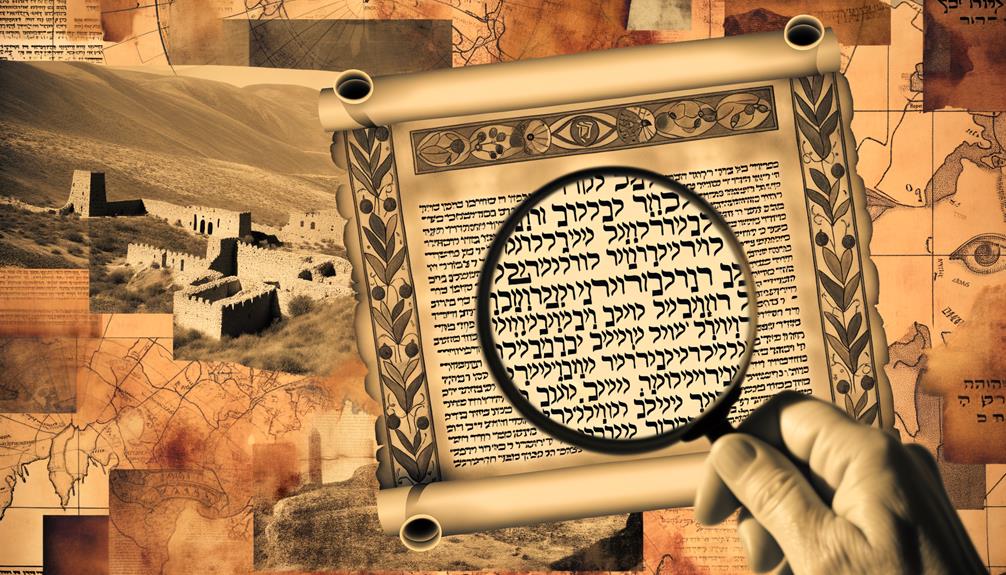
The etymology of Keilah originates from the Hebrew language, where it is believed to mean ‘fortress’ or ‘citadel.’
This nomenclature is deeply rooted in the biblical and historical context, reflecting Keilah’s significance as a fortified city in ancient Judah.
Understanding its linguistic and historical background illuminates the strategic and theological importance of Keilah within biblical narratives.
Origin in Hebrew Language
Etymologically, the name Keilah is derived from the Hebrew root ‘ק-ל-ה’ (Qoph-Lamed-He), which conveys the notion of ‘fortress‘ or ‘citadel.’ This etymological foundation underscores the significance of Keilah as a place of strength and protection.
In the ancient Hebrew context, a fortress was not merely a physical stronghold but also a symbol of security and refuge. This semantic richness contributes to our understanding of the term within the Hebrew lexicon, where the connotations of defense and sanctuary are paramount.
The derivation from such a potent root suggests that Keilah was perceived as an essential bastion within its geographical and cultural milieu, reflecting broader themes of divine protection and communal resilience inherent in biblical narratives.
Biblical and Historical Context
How does the etymological significance of Keilah illuminate its role within the biblical and historical narrative?
The name ‘Keilah’ is derived from the Hebrew root ‘קֵעִיל’ (Qe’il), meaning ‘citadel‘ or ‘fortress.’ This etymology is essential for understanding Keilah’s strategic importance in biblical accounts.
Located in the Shephelah region, Keilah was a fortified city that served as a protective stronghold against Philistine incursions. Its etymological roots underscore its function as a place of refuge and defense, which is vividly illustrated in 1 Samuel 23 when David saves Keilah from Philistine attack.
This act not only highlights Keilah’s defensive role but also marks it as a significant site of divine intervention and leadership within the biblical narrative.
David’s Rescue of Keilah
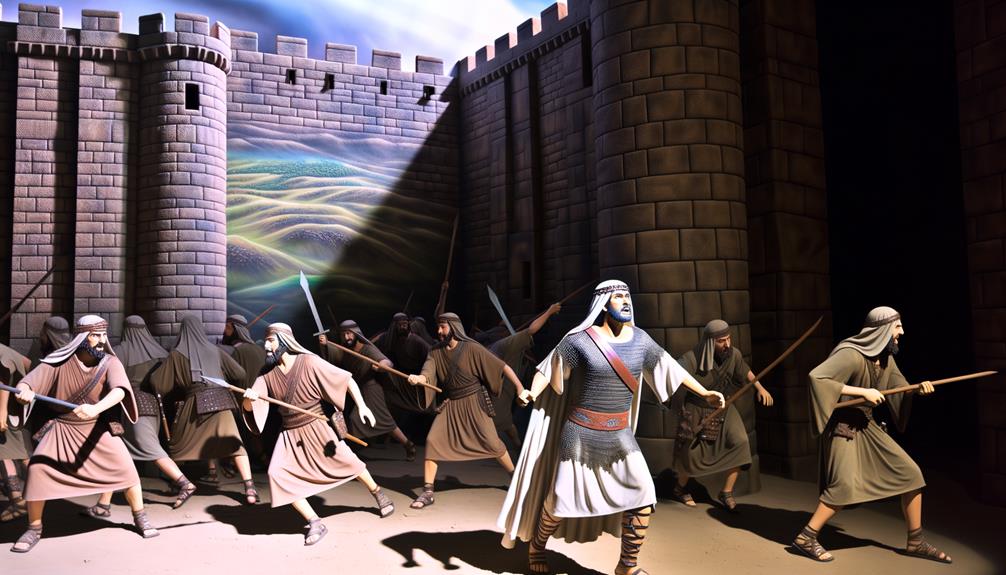
David’s rescue of Keilah provides a compelling narrative of divine intervention and military strategy.
Confronted with the imminent threat of a Philistine invasion, David sought the Lord’s guidance through the ephod, ensuring his actions aligned with divine will.
Following this, David’s tactical acumen led to a decisive victory, safeguarding Keilah and reinforcing his role as a divinely appointed leader.
Philistine Invasion Threat
When the Philistines threatened to invade Keilah, the inhabitants found an unexpected savior in David, who, despite his fugitive status, sought divine guidance to deliver the city from its imminent peril.
This episode illustrates the complex interplay between divine providence and human agency in biblical narratives.
The Philistine invasion posed a significant threat, not merely to Keilah’s physical security but also to the socio-political stability of the region.
David’s intervention was pivotal, as it demonstrated his emerging role as a divinely sanctioned leader, capable of uniting and protecting the people of Israel.
Theological implications abound, particularly in understanding how divine will operates through chosen individuals in times of national crisis, emphasizing God’s sovereignty and the instrumental role of human obedience.
Divine Guidance Sought
In seeking divine guidance before rescuing Keilah, David exemplifies a model of pious leadership that underscores the theological principle of reliance on God’s will for strategic decision-making. This episode highlights the symbiotic relationship between divine sovereignty and human responsibility.
David’s consultation with the Lord through the ephod, as recorded in 1 Samuel 23:2, illustrates a profound theological paradigm: the necessity of seeking divine direction in times of crisis. It is a demonstration to the primacy of spiritual discernment over mere tactical acumen.
| Aspect | Explanation |
|---|---|
| Divine Consultation | David’s inquiry to the Lord prior to action |
| Theological Insight | Emphasizes reliance on divine will rather than human wisdom |
| Spiritual Discernment | Prioritizes seeking God’s guidance in critical decisions |
| Biblical Reference | 1 Samuel 23:2, illustrating the practice of divine guidance |
This narrative serves as a theological cornerstone in understanding the precedence of divine consultation in leadership.
Tactical Victory Achieved
The successful liberation of Keilah exemplifies the tangible outcomes of divinely guided leadership, wherein spiritual obedience translated into tactical triumph.
David’s decision to seek God’s counsel before engaging in battle underscores the symbiotic relationship between faith and strategy. According to 1 Samuel 23:1-5, David and his men emerged victorious, rescuing the besieged town from the Philistines.
This event not only highlights David’s military acumen but also reinforces the theological principle that divine consultation can lead to decisive action. The rescue of Keilah signifies more than a mere military win; it illustrates the importance of aligning human effort with divine will, thereby achieving outcomes that resonate with both spiritual and communal significance.
Such narratives elucidate the broader biblical theme of faith-informed leadership.
Keilah and the Philistines
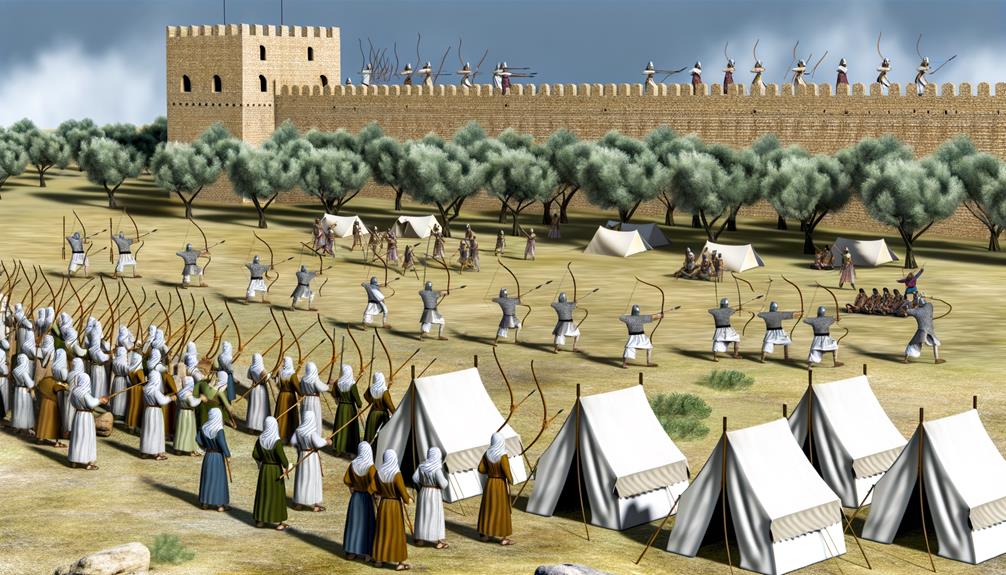
Conflict between Keilah and the Philistines provides a revealing glimpse into the geopolitical and spiritual struggles of ancient Israel. The city of Keilah, located in the Shephelah region, was strategic for both agriculture and defense.
The Philistines, a persistent threat, sought to exploit Keilah’s resources, underscoring the ongoing territorial and ideological battles in the region.
| Aspect | Keilah’s Significance | Philistine Threat |
|---|---|---|
| Geopolitical | Strategic location in Shephelah | Territorial ambitions |
| Economic | Agricultural productivity | Resource exploitation |
| Spiritual | Israelite defense of inheritance | Pagan influence challenge |
This multifaceted conflict reflects the broader narrative of Israel’s struggle to maintain its divinely promised land and uphold its spiritual identity amid external threats.
Divine Intervention at Keilah
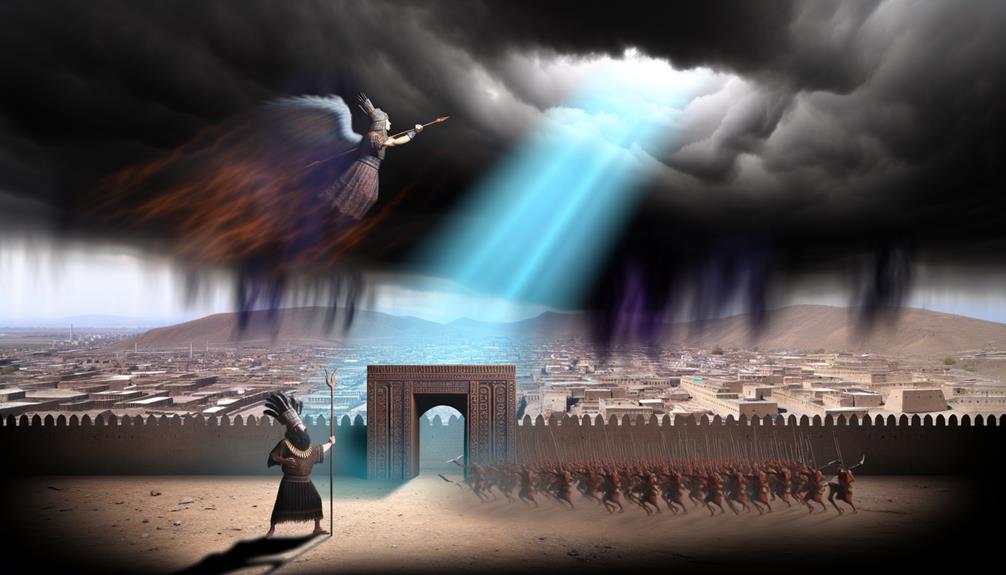
Amidst the ongoing strife between Keilah and the Philistines, divine intervention emerged as a pivotal factor, underscoring the theological dimension of Israel’s struggles.
This intervention is epitomized by David’s reliance on divine guidance through the ephod, an oracular instrument, to discern God’s will regarding his actions in Keilah (1 Samuel 23:6-12).
The narrative highlights an essential aspect of biblical theology: God’s active participation in the lives of His chosen people.
David’s inquiries and subsequent divine responses underscore a dynamic interaction between human agency and divine will.
This event not only reinforces the Israelites’ dependence on divine guidance but also illustrates a broader theological motif of divine sovereignty and providence amidst human conflict and decision-making.
Keilah’s Strategic Importance

Keilah’s strategic significance is underscored by its defensive location within the Judean foothills, offering both military advantage and protection.
Key historical events, including David’s rescue of the city from Philistine aggression, further illuminate its critical role in biblical narratives.
This section will explore how Keilah’s geographical and historical context contributed to its prominence in Scripture.
Defensive City Location
Situated in the lowlands of Judah, the city of Keilah held strategic defensive importance due to its fortified position and proximity to essential trade routes. This fortified city not only served as a stronghold against invading forces but also facilitated control over commerce and communication in the region. The city’s location enabled it to act as a sentinel for the more vulnerable interior territories of Judah.
| Aspect | Description | Significance |
|---|---|---|
| Geographical Position | Located in Judah’s lowlands | Enhanced defense and trade control |
| Fortifications | Strong defensive walls | Protection against invasions |
| Trade Routes | Proximity to major routes | Economic and logistical advantage |
| Military Role | Acted as a military outpost | Security for surrounding regions |
| Strategic Importance | Key to regional stability and security | Essential for maintaining territorial integrity |
Key Historical Events
Demonstrating its strategic importance, Keilah was the scene of significant historical events, including King David’s defense of the city against Philistine attacks as recorded in the biblical narrative. This episode, found in 1 Samuel 23, highlights Keilah’s role as a fortified city capable of providing refuge and protection.
David’s intervention not only underscores his military acumen but also his emerging leadership among the Israelites. The city’s location in the lowland region of Judah made it a valuable asset for control over surrounding territories.
In addition, this incident illuminated the dynamics of divine guidance, with David consulting God before taking action, thereby intertwining Keilah’s historical significance with theological themes of divine sovereignty and providence.
Lessons From Keilah’s Story

The narrative of Keilah in the Bible provides a multitude of theological insights, particularly about divine guidance and human agency in times of crisis.
In 1 Samuel 23, David’s decision to consult God before rescuing Keilah from the Philistines underscores the importance of seeking divine direction. This act of faith contrasts with Saul’s impulsive actions, highlighting the virtue of spiritual discernment.
Additionally, Keilah’s subsequent betrayal of David, despite his deliverance, exemplifies the complexities of human loyalty and the precariousness of political alliances. These events illuminate the necessity of reliance on divine wisdom over human judgment.
Consequently, Keilah’s story serves as a didactic narrative, teaching believers about the intersection of divine providence and human responsibility.
Modern Interpretations of Keilah

Contemporary theological scholarship often reexamines the narrative of Keilah to uncover deeper insights into divine-human interaction and the ethical implications of political and social alliances.
By analyzing David’s strategic decisions and his reliance on divine guidance, scholars debate the intricate balance between autonomy and divine will. This analysis provides valuable perspectives on leadership, loyalty, and morality within a biblical context.
| Aspect | Traditional View | Modern Interpretation |
|---|---|---|
| Divine Guidance | Direct intervention in human affairs | Synergy between divine will and human autonomy |
| Political Alliances | Necessity for survival | Ethical and moral dilemmas |
| Social Implications | Community protection | Complex social dynamics |
This reevaluation underscores the multifaceted nature of biblical events and their enduring relevance in contemporary theological discourse.
Keilah’s Legacy in Scripture
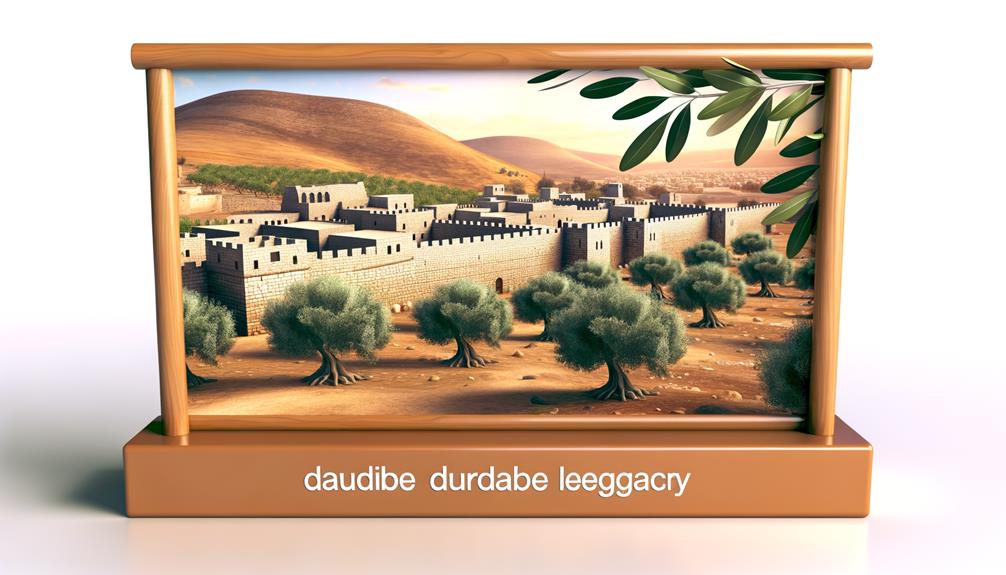
Keilah’s legacy in scripture encapsulates the dynamic interplay between divine providence and human agency, illustrating profound theological themes that resonate throughout biblical narratives.
This ancient city, prominent in the story of David, serves as a microcosm of divine intervention and human decision-making, emphasizing the importance of seeking God’s guidance in times of crisis.
The narrative of Keilah reveals critical aspects of biblical theology, including:
- Divine protection: God’s intervention to protect David and his men.
- Human agency: David’s strategic decisions influenced by divine counsel.
- Moral complexity: The inhabitants’ potential betrayal despite David’s deliverance.
Such themes underscore Keilah’s enduring significance in scriptural exegesis.
Conclusion
Keilah’s confluence of conflict, covenant, and conquest underscores its strategic significance in scriptural narratives. This city, central to David’s divine deliverance, delineates divine intervention and human agency.
Keilah’s etymology, embedded in biblical etiology, enriches the understanding of ancient Israelite settlements. The Philistine presence and David’s decisive actions at Keilah highlight the perpetual power struggle.
Consequently, Keilah’s legacy lingers, linking lessons of leadership, loyalty, and the Lord’s providence in theological discourse.






